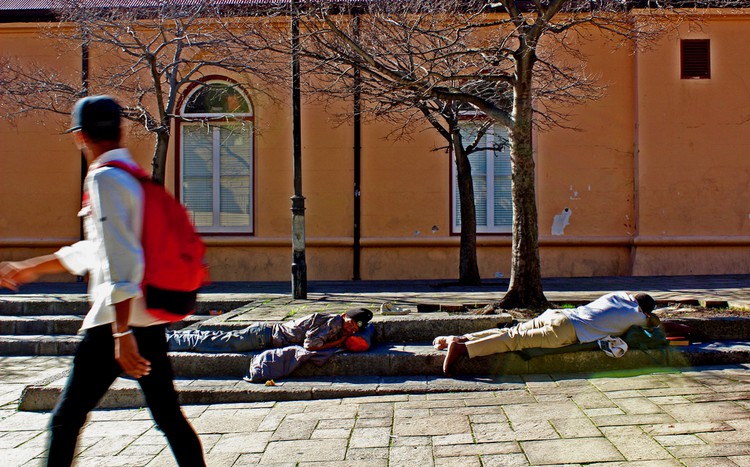Homeless people challenge Cape Town by-laws in court
City by-laws are unconstitutional and discriminatory says Ndifuna Ukwazi Law Centre
A study last year found 14,000 people living on the streets of Cape Town. Archive photo: Masixole Feni
- A group of homeless people represented by Ndifuna Ukwazi Law Centre are taking the City of Cape Town to court over some of its by-laws.
- They say the by-laws “criminalise homelessness”, infringe on fundamental human rights and unfairly discriminate against homeless people.
- Mayor Dan Plato has written that people are only fined when all offers of social assistance are rejected.
Eleven homeless people in Cape Town have gone to court to have several City of Cape Town municipal by-laws declared unconstitutional and discriminatory.
On 31 March, applications were filed at the Western Cape High Court and at the Equality Court to challenge the City by-laws on Streets, Public Places and the Prevention of Noise Nuisances (2007) and Integrated Waste Management (2009).
The applicants are represented by the Ndifuna Ukwazi Law Centre.
In a statement, Ndifuna Ukwazi said that the by-laws unfairly discriminate against homeless people and they infringe on their fundamental human rights, including the rights to equality, human dignity, freedom and security of the person, privacy, freedom of movement and residence, and property.
“These by-laws criminalise homelessness by making it a crime for persons living on the street to conduct ordinary life-sustaining activities, like sleeping, camping, resting, bathing, erecting a shelter or keeping personal belongings in public,” the statement says.
“The by-laws also make it a crime to ‘beg’,” the statement adds.
The first applicant, Carin Gelderbloem, lived on the streets in the city centre for nine years before moving to a homeless shelter last year. She said she was slapped with a R1,500 fine by a law enforcement officer for “littering and dumping” in 2019 while she was moving her few belongings.
“All I had was my shack and I left nothing like papers or anything behind. As far as I’m concerned, littering is when you drop a piece of paper and you walk on, and dumping is if you leave a load of rubbish on one spot.”
“Imagine a homeless person, who has no job or anything, getting a fine of R1,500. And that’s on the lower end. There are people who get fined up to R2,500,” she said.
It was after this incident that Gelderbloem said she and other homeless people planned to challenge the City’s by-laws in 2020, but were unable to pursue it because of the Covid lockdown.
“When we started with the case, I couldn’t even sleep on one spot for two nights in a row. I do believe that [law enforcement] targeted me. I used to camp out at Greenmarket Square, and [law enforcement] took all my stuff. They left me one morning while it was drizzling with just the clothes on my back. They took everything,” said Gelderbloem.
“They don’t regard homeless people as people,” she said.
She also criticised the City for holding meetings to deal with homelessness without including homeless people.
Gelderbloem said that she suffered from depression and anxiety because of the laws. “Imagine sitting up every night and just waiting for law enforcement to come, because I expected them to come every night. I’m still battling with that part of my life.”
In an open letter, Mayor Dan Plato said, “Law Enforcement officers are duty-bound to apply the law equally, and to respond to the hundreds of complaints from residents each month about anti-social behaviour, breaking of by-laws, and crime committed by some people living on the street.”
“When all offers of social assistance are rejected, only then does the City issue compliance notices and fines — the key legal mechanisms available to enforce by-laws.”
“It is no crime to be poor or down on your luck, but every single resident has to comply with by-laws, and the law in general,” said Plato.
A Street People Enumeration report conducted by the City in November 2018 counted about 4,000 individuals living on the streets and just over 2,000 in shelters.
A 2020 study by NGO U-turn, Khulisa Streetscapes and MES estimated that over 14,000 people were living on the city streets.
Ndifuna Ukwazi attorney Jonty Cogger said that as a housing activist organisation, Ndifuna Ukwazi could not ignore by-laws that criminalised homelessness in the midst of a housing crisis.
“These by-laws impose a further barrier to alleviating chronic poverty in circumstances where people are forced to live on the streets. This violates a myriad of fundamental human rights,” he said.
The City of Cape Town will have an opportunity to oppose the application in the High Court and Equality Court. The matter is likely to be opposed and will be heard in court in due course, Cogger adds.
The City said it received notice of the application on Tuesday, and the papers are being perused.
Support independent journalism
Donate using Payfast

Don't miss out on the latest news
We respect your privacy, and promise we won't spam you.
Next: New “R4 million” taxi rank is useless, say taxi drivers
Previous: Parents burn tyres and picket outside education department over incomplete school
© 2021 GroundUp. This article is licensed under a Creative Commons Attribution-NoDerivatives 4.0 International License.
You may republish this article, so long as you credit the authors and GroundUp, and do not change the text. Please include a link back to the original article.
We put an invisible pixel in the article so that we can count traffic to republishers. All analytics tools are solely on our servers. We do not give our logs to any third party. Logs are deleted after two weeks. We do not use any IP address identifying information except to count regional traffic. We are solely interested in counting hits, not tracking users. If you republish, please do not delete the invisible pixel.

